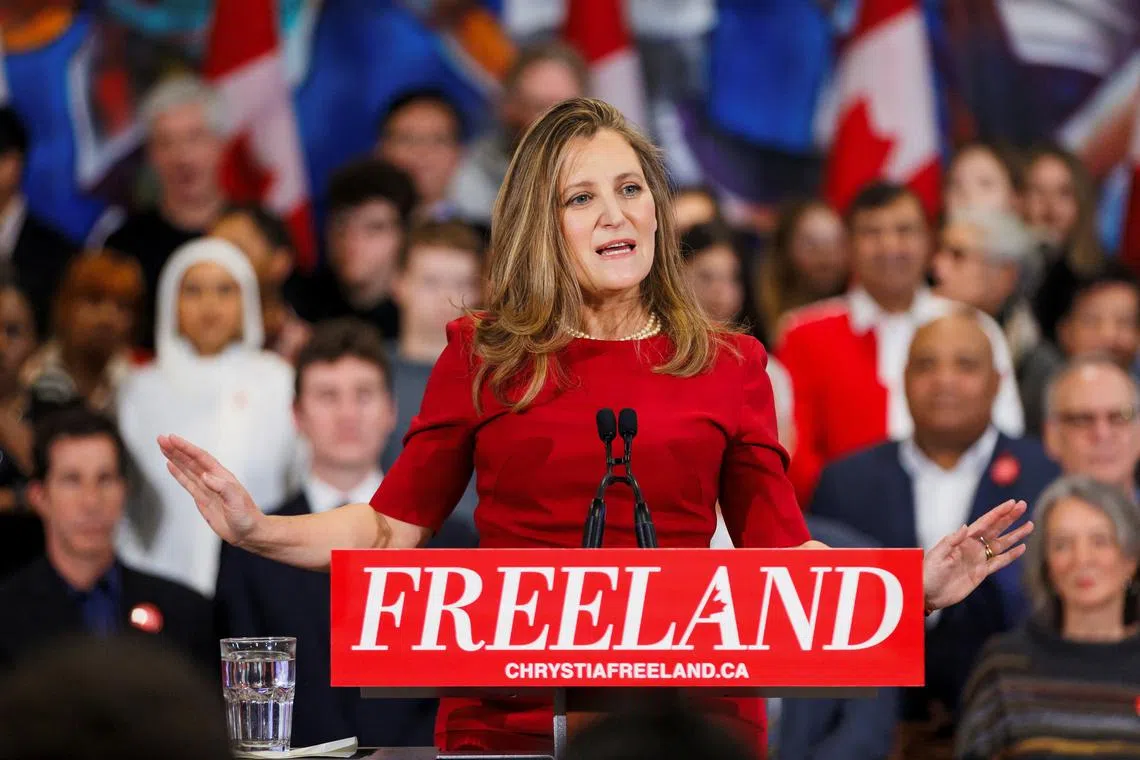Trudeau’s Cabinet lines up behind Mark Carney as ex-banker brushes up on French
Sign up now: Get ST's newsletters delivered to your inbox

Mr Mark Carney has secured the backing of Canada's foreign affairs, environment, energy and labour ministers.
PHOTO: AFP
Follow topic:
OTTAWA – The senior ranks of Prime Minister Justin Trudeau’s Cabinet have made their choice on who they believe should replace him as Canada’s prime minister, throwing their weight behind Mr Mark Carney.
Mr Carney has secured the backing of Foreign Affairs Minister Melanie Joly, Environment Minister Steven Guilbeault, Energy Minister Jonathan Wilkinson and Labour Minister Steven MacKinnon.
He will receive a public endorsement from Industry Minister Francois-Philippe Champagne on Jan 26, said a person close to Mr Champagne.
The support shows that many ministers believe the former central banker is the best bet to counter US President Donald Trump’s trade threats
Ms Joly, Mr Guilbeault, Mr MacKinnon and Mr Champagne are all from the French-speaking province.
Mr Carney, 59, who grew up in Alberta, has been working daily with aides on improving his French language skills, according to people familiar with the matter.
That will matter a lot if he wins the Liberal leadership contest, becomes prime minister and heads into a general election, where he would be up against Mr Pierre Poilievre, a fierce and fluently bilingual debater who leads the Conservative Party, and Mr Yves-Francois Blanchet, leader of the Bloc Quebecois.
Ms Joly, speaking with reporters on Jan 23, said it “was a difficult choice” to back Mr Carney over Ms Chrystia Freeland, the former finance minister who entered the race last week.
Ms Joly said she chose Mr Carney due to his proven ability to handle big crises such as Brexit, which unfolded while he was governor of the Bank of England, and the 2008 global financial crisis, which erupted shortly before he became governor of the Bank of Canada.
Mr Guilbeault, a former Greenpeace activist, said he believes Mr Carney is best placed to manage Mr Trump and to steer Canada’s economy through an energy transition in the years ahead.
“I’ve known him and I trust him and I have great faith in his abilities,” he said.
The backing of Quebec ministers is important for the credibility of Mr Carney’s campaign – his first attempt at winning political office – as there are still questions about how well he can speak French without a script in front of him.
“It should be a source of concern for the Liberals, who badly need Quebec in the next election,” said Mr Jeremy Ghio, a Montreal-based consultant who previously worked as an aide to Ms Joly.
No Liberal leader from outside of Quebec has won a general election in Canada since 1965.
The Bloc Quebecois, a party that represents Quebec’s interests in Ottawa and promotes the province’s independence, is doing well in public opinion polls and appears set to take seats from the Liberals.
Quebec will have 78 of the 343 seats up for grabs in the House of Commons in an election that may happen as early as May.
In addition to improving his French, Mr Carney can help himself in Quebec by spending time on the ground there and through policy stances, Mr Ghio said.
He pointed to the tactics of former Conservative prime minister Stephen Harper, an Albertan.
His French was far from perfect, but in 2006 his government passed a parliamentary motion recognising Quebec as a nation within Canada, which helped the Conservatives build support there.
Ms Freeland, who is seen as Mr Carney’s main opponent in the leadership race and is a more fluent French speaker, was Mr Trudeau’s deputy prime minister for five years and was seen by many as the most powerful member of his Cabinet.

Ms Chrystia Freeland was Prime Minister Justin Trudeau’s deputy prime minister for five years and was seen by many as the most powerful member of his Cabinet.
REUTERS
A handful of ministers have endorsed her, including Justice Minister Arif Virani and Health Minister Mark Holland. Like Ms Freeland, they represent districts in greater Toronto.
Transport Minister Anita Anand, who has a seat in a Toronto suburb, appeared on a video on Jan 2 wearing a Canadian hockey jersey to announce she was backing Mr Carney.
It was Ms Freeland’s scathing resignation as finance minister on Dec 16 that triggered the events that led to Mr Trudeau’s decision to step down
Ms Freeland’s resignation created chaos in the government, as she quit just hours before she was scheduled to deliver a fiscal and economic update to Parliament, leaving Mr Trudeau scrambling to find an emergency replacement as finance minister.
She did it in part because Mr Trudeau had been talking privately about moving her to a different job within the Cabinet and asking Mr Carney to be finance minister.
There are still some bitter feelings within Mr Trudeau’s Cabinet over the way Ms Freeland pushed the government into disarray in December,
Others say Ms Freeland is too associated with the unpopular prime minister after nine years in his Cabinet, and the Liberals would be better off choosing a leader with less political baggage.
Ms Freeland told reporters she was “grateful to the colleagues who have been supporting me”, and pointed out that she also has the backing of multiple regional caucus chairs who play a role in party organising. BLOOMBERG

